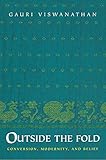Outside the Fold : Conversion, Modernity, and Belief / Gauri Viswanathan.
Material type: TextPublisher: Princeton, NJ : Princeton University Press, [2021]Copyright date: ©1998Description: 1 online resource (328 p.) : 1 table 5 halftonesContent type:
TextPublisher: Princeton, NJ : Princeton University Press, [2021]Copyright date: ©1998Description: 1 online resource (328 p.) : 1 table 5 halftonesContent type: - 9781400843480
- Conversion -- Comparative studies
- Conversion -- Comparative studies
- SOCIAL SCIENCE / Anthropology / General
- Advaitism
- Anabaptists
- Anglicanism
- Bengal Regulations
- Brahmo Samaj
- Calvinism
- Catholics
- Darwinism
- Fabian socialism
- Gorham judgment
- House of Commons
- Jainism
- Jesus Christ
- Legislative Council
- administrative rationality
- age (chronological)
- agnosticism
- alienation
- anarchy
- backsliding
- biographical fallacy
- blasphemy
- church rates
- class consciousness
- colonialism
- cosmopolitanism
- dalits
- democracy
- disestablishment
- ecclesiastical authority
- egalitarianism
- ethnocentrism
- excommunication
- feminism
- foundationalism
- fundamentalism
- gnostic mysticism
- heirship
- historiography
- iconoclasm
- ideology
- individualism
- inheritance
- joint electorates
- knowledge-production
- literary form
- maintenance
- materialism
- miscegenation
- nationalism
- occultism
- orthodoxy
- ostracism
- 291.4/2
- BL639
- BL639 .V579 1998
- online - DeGruyter
| Item type | Current library | Call number | URL | Status | Notes | Barcode | |
|---|---|---|---|---|---|---|---|
 eBook
eBook
|
Biblioteca "Angelicum" Pont. Univ. S.Tommaso d'Aquino Nuvola online | online - DeGruyter (Browse shelf(Opens below)) | Online access | Not for loan (Accesso limitato) | Accesso per gli utenti autorizzati / Access for authorized users | (dgr)9781400843480 |
Frontmatter -- Contents -- Illustrations -- Preface -- Acknowledgments -- Part One DISSENT AND THE NATION -- CHAPTER ONE Cross Currents -- CHAPTER TWO A Grammar of Dissent -- Part Two COLONIAL INTERVENTIONS -- CHAPTER THREE Rights of Passage: Converts' Testimonies -- CHAPTER FOUR Silencing Heresy -- CHAPTER FIVE Ethnographic Plots -- CHAPTER SIX Conversion, Theosophy, and Race Theory -- Part Three THE IMAGINED COMMUNITY -- CHAPTER SEVEN Conversion to Equality -- CHAPTER EIGHT Epilogue: The Right to Belief -- Appendix -- Notes -- Select Bibliography -- Index
restricted access online access with authorization star
http://purl.org/coar/access_right/c_16ec
Outside the Fold is a radical reexamination of religious conversion. Gauri Viswanathan skillfully argues that conversion is an interpretive act that belongs in the realm of cultural criticism. To that end, this work examines key moments in colonial and postcolonial history to show how conversion questions the limitations of secular ideologies, particularly the discourse of rights central to both the British empire and the British nation-state. Implicit in such questioning is an attempt to construct an alternative epistemological and ethical foundation of national community. Viswanathan grounds her study in an examination of two simultaneous and, she asserts, linked events: the legal emancipation of religious minorities in England and the acculturation of colonial subjects to British rule. The author views these two apparently disparate events as part of a common pattern of national consolidation that produced the English state. She seeks to explain why resistance, in both cases, frequently took the form of religious conversion, especially to "minority" or alternative religions. Confronting the general characterization of conversion as assimilative and annihilating of identity, Viswanathan demonstrates that a willful change of religion can be seen instead as an act of opposition. Outside the Fold concludes that, as a form of cultural crossing, conversion comes to represent a vital release into difference.Through the figure of the convert, Viswanathan addresses the vexing question of the role of belief and minority discourse in modern society. She establishes new points of contact between the convert as religious dissenter and as colonial subject. This convergence provides a transcultural perspective not otherwise visible in literary and historical texts. It allows for radically new readings of significant figures as diverse as John Henry Newman, Pandita Ramabai, Annie Besant, and B. R. Ambedkar, as well as close studies of court cases, census reports, and popular English fiction. These varying texts illuminate the means by which discourses of religious identity are produced, contained, or opposed by the languages of law, reason, and classificatory knowledge. Outside the Fold is a challenging, provocative contribution to the multidisciplinary field of cultural studies.
Mode of access: Internet via World Wide Web.
In English.
Description based on online resource; title from PDF title page (publisher's Web site, viewed 07. Nov 2022)


